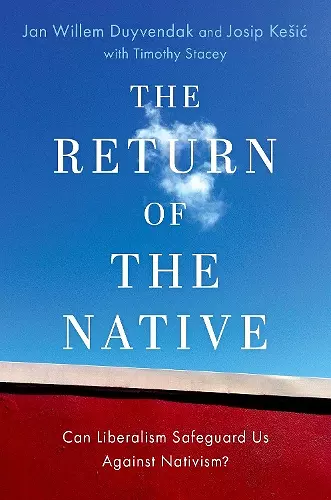The Return of the Native
Can Liberalism Safeguard Us Against Nativism?
Jan Willem Duyvendak author Timothy Stacey author Josip Kesic author
Format:Paperback
Publisher:Oxford University Press Inc
Published:12th Jan '23
Should be back in stock very soon
This paperback is available in another edition too:
- Hardback£88.00(9780197663035)

An in-depth analysis that demonstrates how and why there has been a resurgence of nativist logic. It was once thought that liberalism and globalization would consign nativist logics to the fringes of societies and eventually to history. But if it ever left, nativism has well and truly returned, spreading across nations, across the political spectrum, and from the fringes back into the mainstream. In The Return of the Native, Jan Willem Duyvendak, Josip Kesic, and Timothy Stacey explore how nativist logics have infiltrated liberal settings and discourses, primarily in the Netherlands as well as other countries with strong liberal traditions like the US and France. They deconstruct and explain the underlying logic of nativist narratives and show how these narratives are emerging in the discourses of secularism (a religious nativism that problematizes Islam and Muslims), racism (a racial nativism that problematizes black anti-racism), populism (a populist nativism that problematizes elites), and left-wing politics (a left nativism that sees religious, racial, and populist nativists themselves as a threat to national culture). By moving systematically through these key iterations of nativism, the authors show how liberal ideas themselves are becoming tools for claiming that some people do not belong to the nation. A unique analysis of the most fundamental political transformation of our days, this book illuminates the resurgence of the figure of the "native," who claims the country at the expense of those perceived as foreign.
How are we to understand and respond to the expansion of nativism across the globe? In their brilliant appraisal of 'a nativist logic' in the Netherlands, France, and the US, the authors conclude with wise -- and urgent -- advice for liberals. Structural shifts are behind this turn, they argue, but what counts more is narrative. And liberals need to work on theirs. Get curious about how a narrative works, how it appeals to our yearning to belong. Try creating a liberal narrative which invites the listener into a home which has the feel of comfort with difference-in race, creed, national origin, sexual orientation-and even difference in political opinion. Civilization is a work in progress, and this book helps us do that work." -Arlie Russell Hochschild, Professor Emerita of Sociology, University of California Berkeley, and author of Strangers in Their Own Land: Anger and Mourning on the American Right
The Return of the Native is a well-informed, ambitious, and surprising comparative study of nativism and how it shapes boundaries toward racial and religious minorities and women, by mobilizing shared values of enlightenment and tolerance, inherited from liberalism. The authors do a splendid job at presenting a complex thesis clearly and convincingly. This book will certainly have a significant impact on scholarly exchanges around these topics for time to come." -Michèle Lamont, Robert I. Goldman Professor of European Studies and Professor of Sociology and of African and African American Studies, Harvard University, and author of The Dignity of Working Men: Morality and the Boundaries of Race, Class and Immigration
In this path-breaking work, the authors argue for the growing importance of nativism, or the opposition to an internal minority because of its foreignness. Nativism rests on a naturalized link between a category of people and a particular place that supports claims to prerogatives and rights-and exclusion of the non-native. Beginning with the Dutch case, the authors examine how nativism interacts with racism, nationalism, populism, and, in today's European context, Islamophobia. They draw on decades of collaborative work to explore the several iterations of nativism across countries, and attune us to the dangers of its left-liberal forms, which trumpet the superiority of one's own national values. They also set out ways to promote an alternative vision, that of a liberal politics of belonging. A clear analysis of ideas and forces that trouble the politics of today." -John R. Bowen, Dunbar-Van Cleve Professor, Washington University, and author of Can Islam Be French?
The book is valuable addition to the field for its eloquent conceptualization of nativism, thereby systematically differentiating it from other similar outlooks such as populism or racism. Following an articulate unpacking of the concept, the book duly recognizes the fundamental human need to belong, which does not have to be ascribed along reactionary lines. The authors provide stimulating accounts to substantiate the frames presented, the interplay between the "national rebirth" thesis and the Black Lives Matter movement promoting a decolonizing re-reading of history in the Netherlands being a case in point. In short, the book offers a convincing depiction of the power of nativism in political discourse, demonstrating the mechanisms through which nativist logic has become mainstream even in liberal democracies. * Ipek Demirsu, Ethnic and Racial Studies *
The book draws on cutting-edge social scientific work; its principal audience will be researchers, professors, and graduate students, but it is accessible to advanced undergraduates as well. * Choice *
ISBN: 9780197663042
Dimensions: 156mm x 237mm x 14mm
Weight: 345g
230 pages